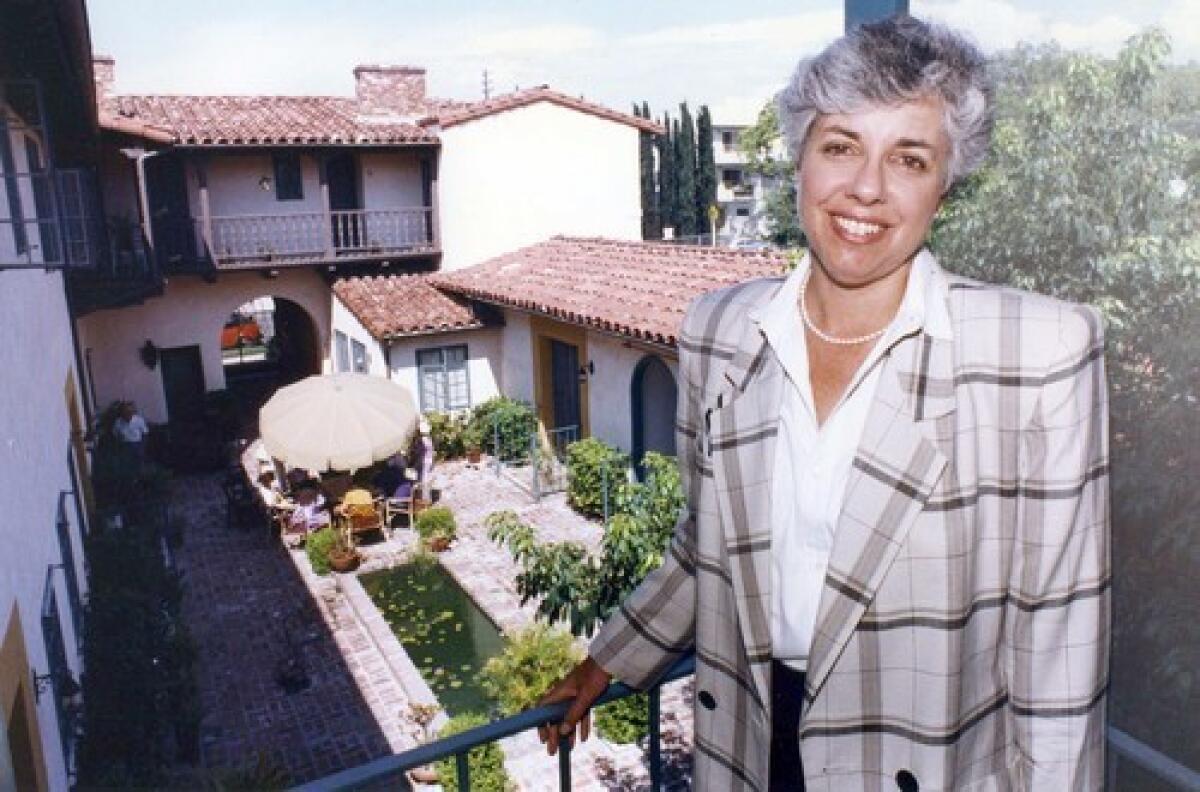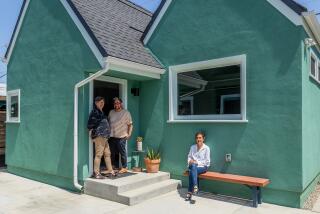Janet Witkin dies at 62; founder of organization to give seniors independent-living options

Janet Witkin, who as a young adult questioned why seniors did not have more independent-living options and then founded an organization in 1978 to pioneer the concept in Los Angeles, died Saturday. She was 62.
Witkin, who was executive director of the nonprofit Alternative Living for the Aging, died of breast cancer at a family member’s home in Burbank, her family said. She was a resident of Glendale.
She started out by setting up a roommate-matching service for seniors who wanted to stay in their homes, then created co-op housing units that enabled group living among the elderly.
Both moves were “trailblazing at the time,” said Los Angeles County Supervisor Zev Yaroslavsky, a former city councilman, who was an early supporter of the project.
“She had this crazy, visionary idea. . . . It was brilliant. She was brilliant,” Yaroslavsky said. “She was indefatigable, persistent and subordinated her ego for the greater cause.”
Between 1982 and 1991, the organization opened five renovated or newly constructed rental cooperatives in the West Los Angeles area that were designed to give dozens of low- and middle-income seniors “independence through interdependence,” a catchphrase Witkin regularly employed in interviews.
The determined Witkin arranged to move a building that was set to be demolished in Westwood to the Beverly-Fairfax area and turn it into a co-op, “even when everyone told her it couldn’t be done,” said Wendy Greuel, a Los Angeles city councilwoman who has served on the organization’s board. “When she set her mind to something, she was going to make sure it happened,” Greuel said. “When she started this organization, nothing else like it existed.”
Witkin also established a free service that matches seniors who want to share their home with another individual. Since its inception in 1979, the program has paired nearly 8,000 people in a process that involves counseling and crafting personality profiles of potential roommates.
“People don’t have to live alone; they don’t have to live in institutions,” Witkin said in a 1986 interview with The Times. “Many have already found that living with an elderly roommate is often easier than moving in with grown children.”
Her crusade to encourage seniors to share housing was at least a decade ahead of the national movement, which began to take off in the early 1990s, according to the Baltimore-based National Shared Housing Resource Center.
The notion that there should be more alternatives to institutional care struck Witkin -- then in her 20s -- when she watched her grandfather’s health quickly decline after he entered a nursing home, she recalled in Betty Friedan’s 1993 book “The Fountain of Age.”
“I was appalled at what happened to my grandfather,” Witkin said in the book. “Two people to a room, who didn’t want to be there, uprooted, giving up all control over their days. . . .”
She also was “perplexed as to why people were in such institutions who did not need medical care,” Witkin told Friedan. “It became clear that they simply didn’t have many options.”
Trained as a teacher, Witkin learned to write grants and tried out her vision for alternative senior living on members of Temple Isaiah in West Los Angeles, where she was a committed volunteer. One member who listened was Yaroslavsky.
“If there were saints in the Jewish religion, I would nominate her,” Yaroslavsky said. “She was always, always, 100% of the time, thinking about others.”
Born Dec. 7, 1946, in Chicago, she was the eldest of two children of Martin and Gloria Witkin. When she was 1, her family moved to Los Angeles, and her father eventually opened San Fernando Hardware and Sporting Goods.
In the late 1960s, Witkin graduated from UCLA with a bachelor’s degree in English and speech. She also earned a master’s degree in education and sociology from the school.
She taught kindergarten and then taught English as a second language to adults. On weekends, she often taught at her temple and took teenagers to visit a board-and-care facility, where she again was stunned to see seniors who had entered an institution “prematurely” and “unnecessarily,” Witkin once said.
“I want to create a positive environment for people to get old in -- and that they don’t have to be rich for,” Witkin said in The Times in 1982 when the program’s first co-op opened in a renovated duplex in the Beverly-Fairfax area.
The structure had been renovated with private and public money that Witkin raised as a pilot project in low-cost housing for the elderly.
At the time, each resident paid $300 a month -- it is now no more than double that -- for a private room and bath, five dinners a week and a communal kitchen and living area.
Tom Safran, an affordable housing developer and former board president of Alternative Living for the Aging, said that Witkin’s “tenacity was legend.”
“She’s created a lasting impact by emphasizing the importance of housing for seniors,” he said. “She showed that we all can make a difference.”
Witkin is survived by her brother, Ralph; her partner, Jane Goldberg; and a daughter, Ayana, and son, Marty, with her former partner, Loretta Coha.
Services will be held at 3 p.m. Tuesday at Hollywood Forever Cemetery, 6000 Santa Monica Blvd., Los Angeles. Following the service, a gathering will be held at Congregation Kol Ami, 1200 N. La Brea Ave., West Hollywood.
Instead of flowers, the family suggests donations to Alternative Living for the Aging.
More to Read
Sign up for Essential California
The most important California stories and recommendations in your inbox every morning.
You may occasionally receive promotional content from the Los Angeles Times.











